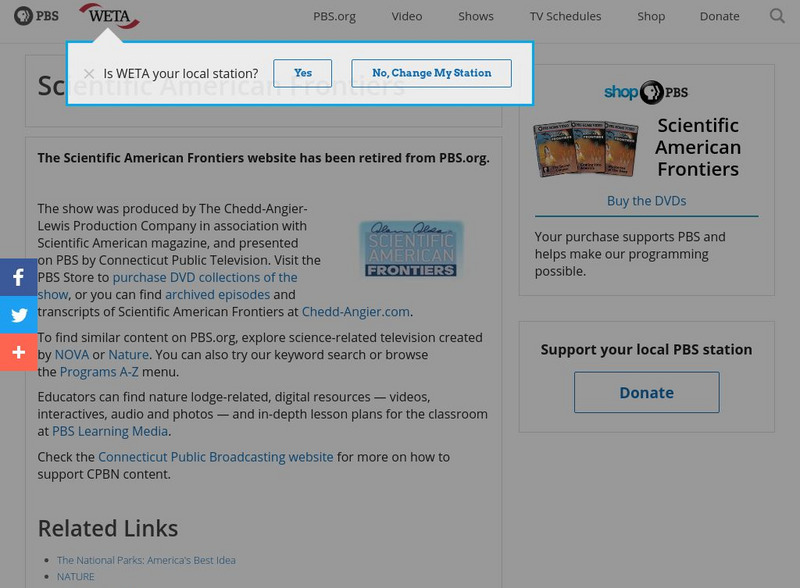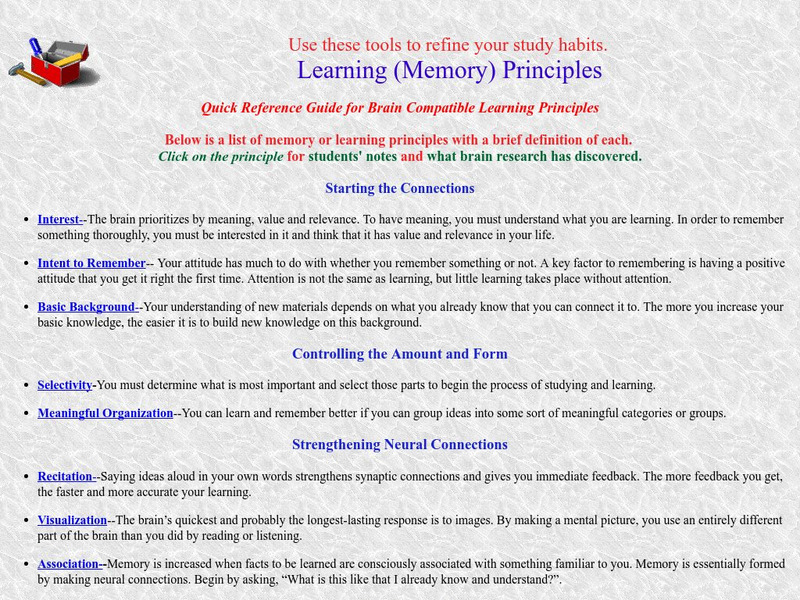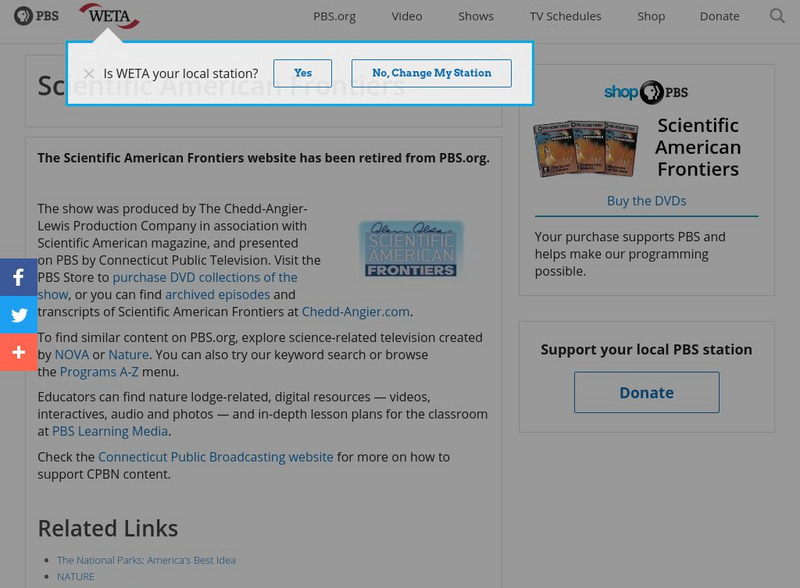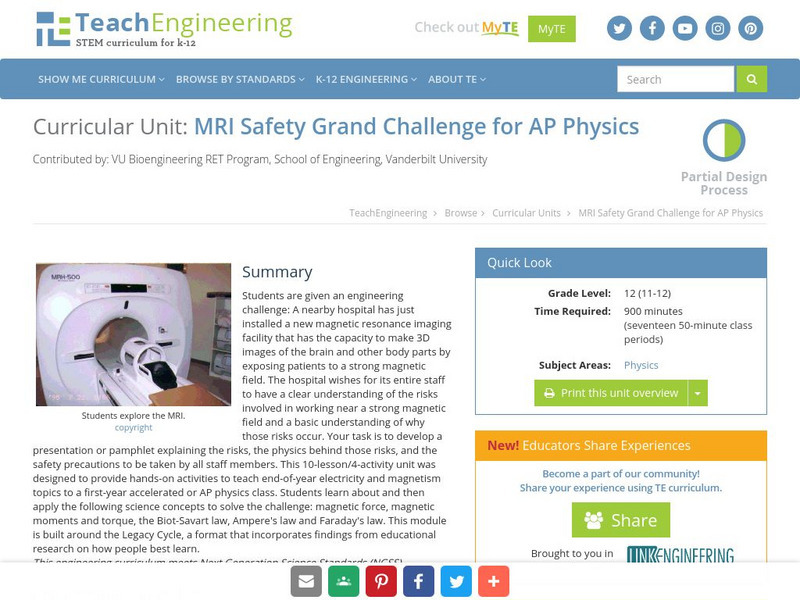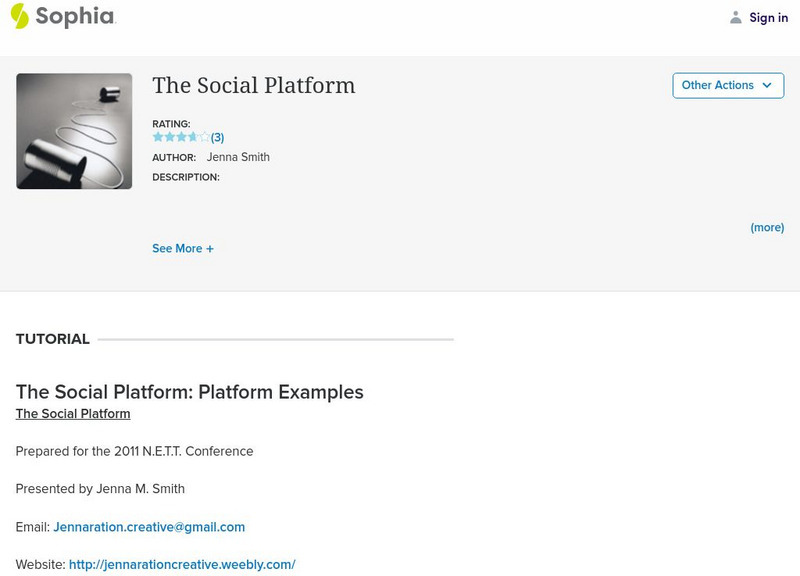CommonLit
Common Lit: "Teenage Brains Are Malleable and Vulnerable" by John Hamilton
A learning module that begins with "Teenage Brains are Malleable and Vulnerable, Researchers Say" by John Hamilton, accompanied by guided reading questions, assessment questions, and discussion questions. The text can be printed as a PDF...
Other
Design Share: 12 Design Principles Based on Brain Based Learning Reserach.
This article, presented in a workshop, provides 12 design principles based on brain-based research.
Other
Florida Education Association: What Is Brain Based Learning?
This article provides an explanation of the ten principal strategies involving Brain-Based Theory.
PBS
Pbs Learning Media: The Adolescent Brain
In this transcript from FRONTLINE: "Inside the Teenage Brain," neuroscientist Dr. Jay Giedd discusses new research on brain development in teenagers.
Other
Jensen Learning: Secrets to Ramping Up Student Effort: 10 Step Checklist
Over the years, student effort has been called many things. Some call it "motivation" and others call it "work ethic." But no matter what you call it, students will never rise to their full potential without a strong effort. Here is what...
SEDL
Classroom Compass: How Can Reserach on the Brain Inform Education?
This website offers references, programs, and implications for teaching focused on brain-based learning.
Other
Edutopia: Six Tips for Brain Based Learning [Pdf]
Discover the research behind Brain-Based Learning. This resource includes classroom projects and resources as well as a reading list.
PBS
Pbs Teachers: Scientific American: New Research Into Dyslexia
Research the array of sophisticated technologies scientists use to look closely at the brain. Diagram the major lobes of the brain and explore the functions of the frontal lobe to learn about how dyslexic individuals process information.
Incredible Art Department
The Incredible Art Department: Strategies and Research in Instruction
Summarizes what is known about learning from research on the brain and suggests related strategies to use in the classroom. Also discusses the main techniques and strategies that are in wide use today including, for example,...
PBS
Pbs Learning Media: Your Brain and Moral Decision Making
In this segment from Curious, scientists conduct an experiment to learn how different areas of the brain are stimulated when making moral decisions.
Other
Mtsu: Memory Principles & Strategies
Explore memory principles and strategies. Before you go to this site, list the ways you usually try to remember things. Write these strategies down (share with someone else if possible). Once you have written your strategies down, take a...
PBS
Pbs Teachers: Pieces of Mind: Old Brain, New Tricks
Conduct an experiment to find out how various senses compete during the learning experience. Explore the relationship between age and language by employing research methods of interviewing, transcription and statistical analysis.
Biotechnology Institute
Biotechnology Institute: Your World: Investigating [Pdf]
Take a glimpse at the way normal brains work and about brain disorders. Learn how research and technology help us learn about the fundamental molecular workings of the brain.
Other
The Second Principle: Brain Based Education: An Overview
This resource provides historical information, core principles, implications and suggestions, 12 design principles, and suggestions to utilize both music and art.
Science Buddies
Science Buddies: No Pain, Lots of Game
This science fair project investigates whether video games, and other forms of mental distraction, have the power to relieve pain. You will research and learn about gatekeeper cells, which control how the brain perceives pain, and how...
TeachEngineering
Teach Engineering: Mri Safety Grand Challenge
This module was written for a first year accelerated or AP physics class. It is intended to provide hands on activities to teach end of the year electricity and magnetism topics including the magnetic force, magnetic moments and torque,...
Other
On Science: Addicting Kids to Nicotine
Summarizing research found at the Mayo Clinic, this article explains why kids, who have only smoked a few cigarettes, "experience the same symptoms of nicotine addiction as adults who smoke heavily." Learn about how nicotine affects the...
PBS
Pbs Teachers: Scientific American: Memory Tests
Explore scientific research saying that continued brain activity may delay or slow the loss of memory function. Investigate and practice different techniques to increase recall.
Scientific American
Scientific American: You Snooze, You Win
This article, published by Scientific American (July 3, 2002), highlights new research which indicates that morning sleep and afternoon naps aid mental and physical learning.
Sophia Learning
Sophia: Time Management: Teaching With the Social Platform
Created to teach students of the 21st century, SOPHIA is bringing 21st century teaching resources straight to your fingertips. Approach your classroom in a brand new way and your students will never be the same again.






